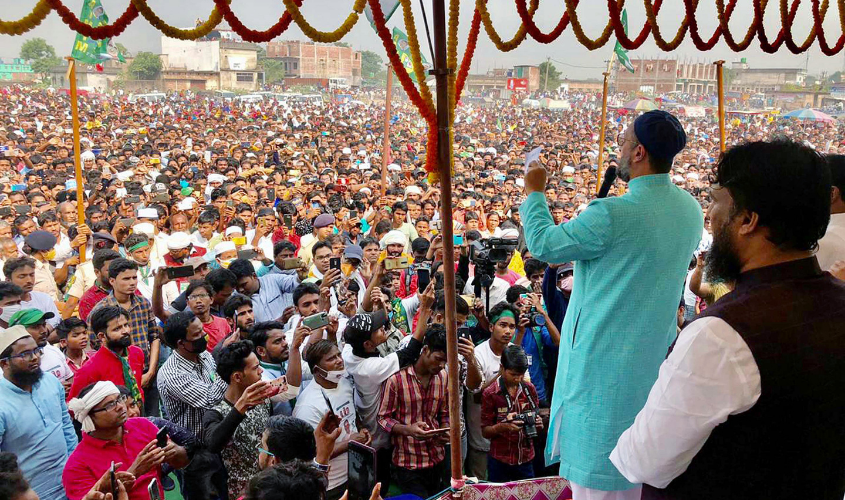The Hyderabad based All India Majlis-e-Ittehad-ul-Muslimeen (AIMIM) is likely to contest over 70 Assembly constituencies in the West Bengal elections scheduled to be held next year, with the aim to tap into the large minority vote-base in the state.
The decision to contest the Bengal Assembly elections was announced by AIMIM chief Asaduddin Owaisi after winning five seats in the minority dominated Seemanchal region in Bihar, which concluded its Assembly elections on Tuesday.
According to AIMIM sources The Sunday Guardian spoke to, the party has been working on the ground in Bengal to galvanise the support of the young Muslim population in the state for the past three years. If these sources are to be believed, AIMIM has been able to establish a cadre base in many of the minority dominated constituencies across the state.
An AIMIM leader from Bengal told this correspondent: “There are at least 15 districts in Bengal where the AIMIM has been able to establish itself. The Mamata Banerjee-led Trinamool Congress has not done anything for minorities. The minorities here are the poorest in the country and have been used just for vote bank politics by all political parties. We are going to contest on at least 70 seats in the state where we have been able to garner strong support from among the people.”
Sources from the AIMIM Bengal unit also said that the party is strong in the minority-dominated districts of Malda, Murshidabad, Uttar Dinajpur and along the Indo-Bangladesh border areas of North 24 Parganas, South 24 Parganas and in some of the border areas of North Bengal, owing to a large number of minority population in these areas and the economic backwardness of these districts.
The “minorities” constitute around 59% of Malda district’s population, while the figure in Murshidabad district is over 66%. The border district of Uttar Dinajpur also has about 50% minority population.
Even the Indo-Bangladesh border districts of North and South 24 Parganas have seen a sharp rise in minority numbers over the last seven to eight years. According to unofficial data, the minority population in these districts has risen from 30% in 2011 to at least 40% over the last few years.
The AIMIM leader quoted earlier said that, after the results of the Bihar elections, it has become clear to them that the minority population trusted them greatly and had seen through Mamata Banerjee’s vote bank politics, and, therefore, the AIMIM was going to work in Bengal whole-heartedly to teach Mamata Banerjee, who had compared the Muslims to a “milking cow”, a lesson.
AIMIM’s Bengal observer and national spokesperson, Syed Wasim Waqar, told The Sunday Guardian that the party was going to contest the Bengal elections due next year.
He said, “We will be contesting the upcoming Bengal elections with our full might. We are conducting our internal surveys in most of the districts in Bengal and we are receiving overwhelming feedback from the ground. Based on this feedback, we will decide our strategy for Bengal. I would also like to say that Bengal has about 36% to 42% Muslim population, but we will not only contest riding on a minority vote bank politics, but we would also like to take along with us the Dalits and secular Hindus as we talk for the nation and the rights of the people.”
The AIMIM, which won five seats in Bihar, denting the prospect of the Tejashwi Yadav-led RJD in the state, has also caused worries for the Mamata Banerjee-led TMC in Bengal. Banerjee has been banking on minority votes in at least 70 to 80 constituencies out of the state’s total 294 constituencies.
Several TMC leaders and even the Congress in Bengal have alleged that the AIMIM is the “B-Team” of the BJP, which works during elections to dent Opposition votes and have often called AIMIM as a “vote cutter” party.
Reacting to these comments, Wasim Waqar said, “We have the right to contest in any state in India like any other political party
Asked if the AIMIM was in talks with the TMC in the state for an alliance, Wasim Waqar said, “Let this be decided by the TMC, whether they want to contest elections in an alliance with us or whether they want to be our enemy in the political battleground.”

